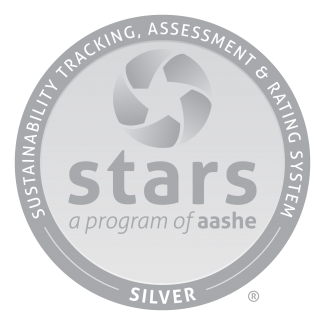
South Dakota State University has maintained its STARS Silver Rating from the Association for the Advancement of Sustainability in Higher Education, in recognition of its sustainability achievements.
STARS, the Sustainability Tracking, Assessment and Rating System, is a benchmarking tool that measures and encourages sustainability in all aspects of higher education. SDSU received a bronze rating in 2016 and a silver rating in 2020.
“It’s exciting that we maintained our Silver Rating. It recognizes that we have sustainability efforts in place here on campus,” said Jennifer McLaughlin, SDSU’s sustainability specialist. “It also helps us see the path forward. If we want to continue to improve our sustainability, it really takes a campuswide effort to implement larger-scale initiatives. It’s not just one staff member or one office—it has to come from all different sections of campus.”
STARS participants report achievements in the areas of innovation and leadership, operations, academics, engagement, planning and administration.
McLaughlin said areas where SDSU earned full points and was better than peer institutions included sustainability curriculum workshops for faculty members, helping them integrate sustainability into their classrooms and learn how it connects to their different fields. Other areas that received full points or were above average compared to peers include, but are not limited to, SDSU’s wellness program; outreach engagement via newsletters, social media, articles, events and more; electronics purchases meeting sustainability certifications and water usage.
McLaughlin said SDSU’s scores also improved in academic courses, learning outcomes and energy consumption. SDSU earned innovation points for efforts such as Jack’s Cupboard, stormwater modeling and grounds certification, such as Tree Campus USA and Bee Campus USA.
Extra points came from:
- SDSU’s Native Plant Initiative, which supports the use of native plants in private and public lands in the Northern Great Plains through research, education and outreach.
- The Wizipan Leadership and Sustainability Program, a unique partnership between the Indian University of North America, the Crazy Horse Memorial Foundation and SDSU.
- The Wokini Initiative, SDSU’s collaborative and holistic framework to support American Indian student success and Indigenous Nation-building.
McLaughlin said more than 100 people on campus contributed to SDSU’s report.
With more than 900 participants in 40 countries, AASHE’s STARS program is the most widely recognized framework in the world for publicly reporting comprehensive information related to a college or university’s sustainability performance.
Upon the report’s submission, universities are rated based on the percentage of points earned: platinum, gold, silver, bronze and reporter. Unlike other rating or ranking systems, this program is open to all institutions of higher education and the criteria that determine a STARS Rating are transparent and accessible to anyone. Because STARS is a program based on credits earned, it allows for both internal comparisons as well as comparisons with similar institutions.
The STARS rating lasts for three years.
“STARS was developed by the campus sustainability community to provide high standards for recognizing campus sustainability efforts,” AASHE Executive Director Meghan Fay Zahniser said. “South Dakota State University has demonstrated a substantial commitment to sustainability by achieving a STARS Silver Rating and is to be congratulated for its efforts.”
- Contact:
- Telephone number: 605-688-5544
Republishing
You may republish SDSU News Center articles for free, online or in print. Questions? Contact us at sdsu.news@sdstate.edu or 605-688-6161.

